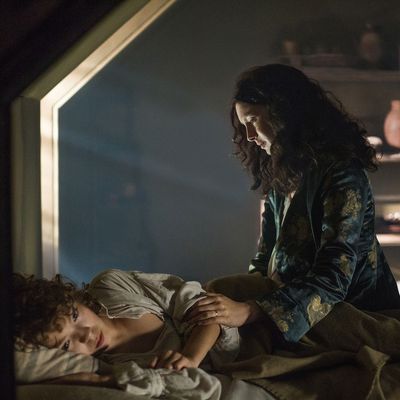
As Outlander tells us again and again, so much depends on democracy. Any system of rule by which a king passes power to his firstborn son is inherently broken and ill-fated. People must earn the right to lead, not inherit it.
Since the audience already buys into that notion — it’s the premise of Western-style government, after all — any grandstanding on the issue could seem to be moot. But Diana Gabaldon’s stories manage to underline it without being didactic. She reminds us why it’s so important to let people determine their own destinies. The Bonnie Prince Charlie is a fool, but he’s the heir of King James, so scores of men will soon go to their deaths fighting for him. Young Simon may also be a fool, but he’s the heir of Jamie’s wily grandfather, Lord Simon Lovat, so dozens of men may also go to their deaths fighting under him.
Meanwhile Jamie feels compelled to confess to Claire the shameful fact that his father was illegitimate, born of a dalliance between the Old Fox and a servant. He makes the strategic choice to disclose this while getting undressed, as though anyone could think straight while Sam Heughan takes off his shirt. Even if they had been talking at a conference table, though, Claire wouldn’t care that Jamie’s father was a bastard; she doesn’t believe that the circumstances of a person’s birth determine that person’s worthiness any more than their gender should. In that latter opinion, at least, she is joined by Jamie, but not many others.
We may not be explicitly reminded of it often, but Outlander secures us to the past, when women were roughly valued on par with cattle. We take it for granted that Jamie respects his wife’s opinions — that Jamie respects his wife — but his behavior is remarkable in context. Lord Lovat exhibits the norm: casual misogyny, and a belief that ladies are okay as decoration as long as they stay silent. That’s why Claire has to inform Laoghaire that any woman has more to offer a man than her body. The girl might never have another chance to learn.
How does Laoghaire end up crossing paths with our heroes again? How, in other words, does this episode turn into one big family reunion? The Frasers have returned from Paris, grateful for a reprieve from trying to scheme against the Jacobites, but they soon discover that Scotland is no picnic, either. An idyllic rural existence with Janet and her loving family is not in the cards. Prince Charles has declared his intention of leading a rebellion against the British, and he has taken the liberty of adding Jamie’s name to the list of Scottish clans supporting his cause. In essence, Jamie has been drafted. Since he can’t avoid the fight, he reasons to Claire, he may as well try to win it. So off Jamie goes to woo his crafty grandsire, a man he’s only met once, for the Old Fox’s wealth and men.
However, his uncle Colum MacKenzie is on hand to thwart him. Colum doesn’t need Claire’s knowledge of history to conclude that this third Jacobite uprising, still lacking in real support from France or other allies, won’t end well, so he urges Lord Lovat to join the MacKenzies in pledging to remain neutral. Lord Lovat is willing to do whatever’s in his best interest; he’s the type of win-at-all-costs man who would, on a reality show, snarl that he’s not there to make friends. He’s also the type to casually suggest he might rape (or have his men rape) his own grandson’s wife, which would even raise eyebrows on Survivor. Jamie must protect Claire, once again, by turning her into La Dame Blanche. Apparently, fear of White Ladies extends to both sides of the sea.
Like many power-hungry men, the superstitious Lord Lovat fears what he cannot control. He demands to hear how his own seer believes the Jacobite uprising will end, though considering his temper, it’s no wonder she is reluctant to share her answer (the chopping block) with him. He also seems to believe Claire when she pretends to have a vision of an executioner, which she concocts to keep Jamie from signing over Lallybroch to his grandpa in exchange for Lord Lovat’s troops.
Of course, Claire is convincing. Maybe all these years of life as a time-traveler have, in a way, turned her into the White Lady. When Laoghaire gets down on her knees and begs forgiveness, Claire certainly has no trouble assuming the same role of judge and jury she played last week for King Louis. An abject Laoghaire insists that she has changed and Claire doesn’t give even half a damn. Later, she relents, but only to use Laoghaire for her own ends: The girl looks like a Vermeer, and Simple Simon is smitten with her. Prompted by Claire, Laoghaire encourages the boy to join the fight.
In the end, that’s what does the trick. Although Lord Lovat signs the MacKenzie’s statement of neutrality, he sends his men with his son. He seems to think if he plays both sides, he can avoid the axe. But we can still see the executioner waiting behind him, as surely as we can see the executioner waiting behind the Scottish clans who saddle up for this brave, foolhardy endeavor. There’s no way that Prince Charlie can defeat the British, and deep down, Claire and Jamie both know it. But they want to go down fighting. They’re little-d democrats: They have faith in free will, not in fate; in bravery, not birth order. They believe in the ability of individuals to make a difference. Even though you know they’re doomed, you can’t help but root for them as the ride off to the battlefield.

